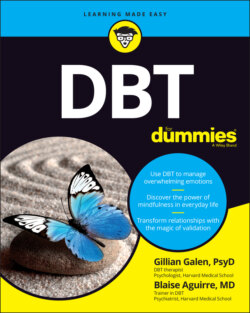Читать книгу DBT For Dummies - Gillian Galen - Страница 47
Matching your reaction to what is in front of you
ОглавлениеWhen you’re in the moment, before you can expand your awareness, you must regulate whatever strong emotion is coming up. Emotions like fear, anger, shame, jealousy, and envy can be particularly challenging to work with. Sometimes you’ll need to use another approach, such as employing DBT distress tolerance skills (see Chapter 11), to decrease the intensity of how you feel, and then it will be much easier to open your mind to new or other information.
If you’re an emotionally sensitive person, sometimes trying to match your level of emotion to the situation in front of you can be hard. This makes a lot of sense, because emotionally sensitive people tend to feel things longer and more deeply than the average person. Here are some skills you can work on:
Think about someone who reacts to situations in a way that you would like to react. Ask yourself how they would react in this situation, and compare your reaction to theirs.
Use self-validation by recognizing how your emotions make sense, and stay away from judging yourself. This will help you decrease the intensity of your emotions and access your inner wisdom to assess your reaction. It’s often self-judgment, self-blaming, and self-invalidation that continue to drive up the intensity of your emotions and make it hard to think (see Chapter 5 for more on self-validation).
Take five mindful breaths to help you decrease the intensity of your emotions. Just taking a few breaths will help begin to calm both your body and your mind.
Be aware of topics or situations that prompt your reactivity. This awareness will help you know that certain situations leave you at a higher risk to be reactive so that you can plan ahead for them. Some people find it helpful to identify these topics or situations as “red flags” and then make a skills plan or cope ahead plan to use when they come up. If you can identify these red flags, you can catch yourself before you react and instead use your skills.
Matching your reaction to what is in front of you is a skill, and skills improve with practice. As you master this skill, you’ll find that what now feels reactive and almost automatic will become deliberate and filled with choices.
